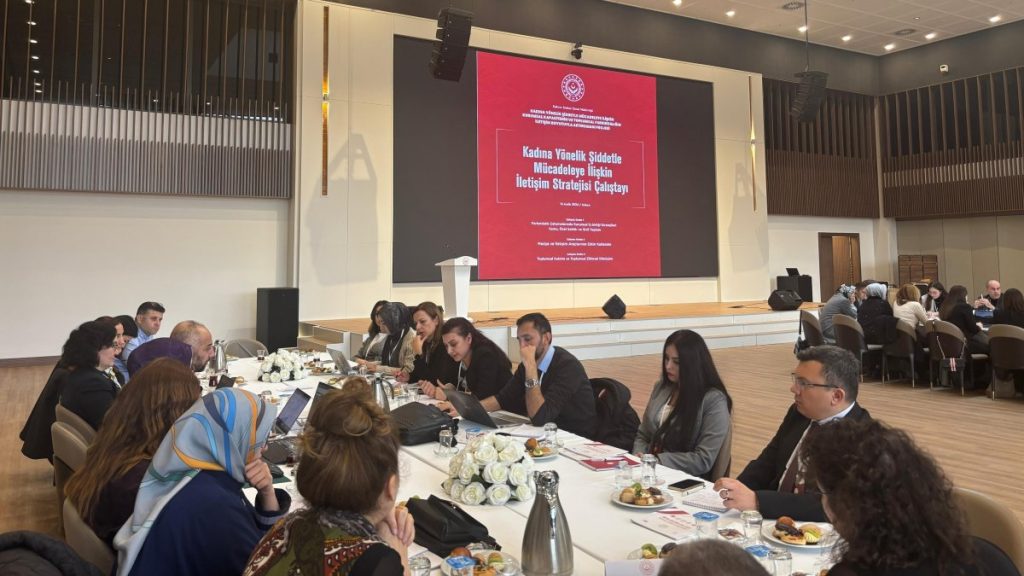Representatives from the media, government, private sector and nongovernmental organizations came together on Monday to work on a communications strategy for the fight against violence against women – an enduring problem that affects the everyday life of millions of women in Türkiye.
A workshop organized by the Ministry of Family and Social Services in cooperation with Ankara Hacı Bayram Veli University and led by Oğuz Göksu, head of the Press and Broadcasting Department of the Directorate of Communications, focused on creating a road map for the upcoming years and generated heated discussions in several areas.
The working group on media, of which I was part, sought answers to questions such as how journalists can be trained in publishing incidents of violence against women; what kind of language should be used; what messages should be given to the public to decrease the phenomenon; how new technologies such as artificial intelligence and social media platforms can be used effectively and what kind of campaigns would draw attention to the problem. The strategy also mulled designing a logo, slogans and perhaps even a mascot to represent the fight against violence.
What all journalists, bureaucrats and academics agreed on in my group was that the struggle must begin in childhood. Both the language and norms taught in school and at home must be revised to tackle male-dominated norms and traditions and reach gender equity. The next step will be to oversee cartoons, games and TV series to ensure they do not encourage harmful norms and language against women. On this topic, the group was split, with one party arguing that governmental institutions should regulate these platforms, including social media, and another insisting that restrictions are in vain, stressing that parents should be educated to oversee the content used by their children.
The next tricky question was how to handle the phenomenon of violence against women in media. Here again, disputes arose, with some arguing that violence against women should not be published in media to prevent it from becoming a normal phenomenon in people’s minds and prevent it from incentivizing similar cases. However, many also expressed that not representing cases in media and ignoring the issue is also not the solution and would harm the public’s right to access news. As a solution, what could be done would be to decrease the frequency of violence-focused news, not detailing how the violence was enacted, sensoring the personal information of victims and carefully constructing the language of the news article.
Academics at the workshop especially underlined that male offenders are often allowed “excuses” for their violent behavior. As a result, participants agreed on the need for something like a handbook for journalists to effectively report on violence against women to avoid softening the causes of the issue. Likewise, they agreed that universities’ communications departments should be encouraged to incorporate lessons on the issue into their curriculum.
Both conventional and social media continue to be vital for the fight against violence against women. News articles help raise awareness of the problem, challenging harmful norms, empowering women, pressuring the government for a solution, exposing systemic failures, advocating for stronger legal protections and elaborating the means with which women can seek help.
Violence against women in Türkiye remains a significant concern, with recent reports indicating that over 400 women have been murdered in 2024 alone. Additionally, a 2022 Human Rights Watch report highlighted that close to 40% of women in Türkiye have experienced physical and/or sexual violence during their lives.
Despite existing legal frameworks, enforcement of laws protecting women is seen as inconsistent, creating a sense of impunity for perpetrators. Furthermore, societal attitudes often perpetuate victim-blaming and discourage women from seeking help. Economic dependence also plays a role, as many women lack the financial means to leave abusive relationships.
Women in Türkiye are calling for comprehensive measures to address these challenges. Their expectations include stricter enforcement of existing laws, improved access to support services such as shelters and legal aid, and societal shifts toward gender equality. Educational initiatives that challenge harmful stereotypes and promote women’s rights are also deemed essential.
Despite the remaining challenges, it is valuable that the struggle to identify the problems and look for solutions continues amid Türkiye’s turbulent agenda. Addressing these obstacles and meeting the expectations of women are crucial steps toward creating a safer and more equitable society in the country.


